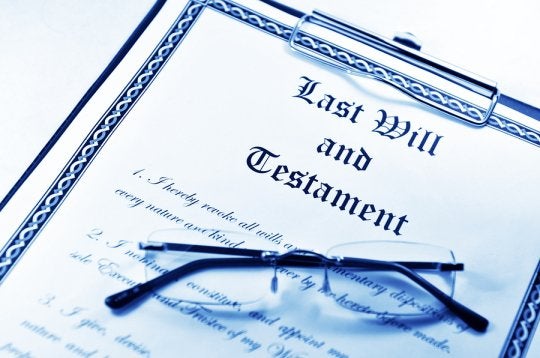-
Getting Help for Speech Problems After a Traumatic Brain Injury
Traumatic brain injuries (TBIs) can cause significant deficits across multiple areas of functioning. Patients with severe TBIs often require intensive therapy, including speech therapy. It’s important for these patients and their families to contact a lawyer in Tracy or Livermore as soon as possible. A personal injury lawyer can help families recover compensation to pay for these essential therapies.

When you watch this video, you’ll learn more about speech therapy and the importance of having an injury lawyer seek compensation on your behalf. The speech therapist interviewed here explains that the recovery process is unique to each patient; it’s difficult to predict exactly how long a patient will be in therapy. The attorney may need to consult the speech therapist regarding the patient’s anticipated future therapy needs.
-
Attaching Conditions to Inheritances
When drafting your last will and testament in the Tracy or Manteca area, you may wish to bequeath gifts to your loved ones. Unfortunately, not every heir makes wise financial decisions upon receiving an inheritance. There are ways of attaching conditions to inheritances that dissuade heirs from squandering their newly acquired assets. Talk to your attorney about this approach when you draft your last will and testament.

Your lawyer may suggest moving assets into a trust. You can then appoint a responsible trustee to distribute the assets to your heir in a fiscally prudent manner. The trustee will have the final word on whether to accept or reject the heir’s spending requests, although you can provide guidance on this matter. Another option is to establish a regular flow of money from the trust to the heir. For example, the heir could receive a certain percentage at age 18, another payment at age 21, and so on. You can even attach incentives to the inheritance. A trust may only make payments when the heir enrolls in college, graduates from college, or completes an addiction recovery program, for example.
-
Addressing the Issues of Estate Planning in a Blended Family
Every adult can benefit from seeking estate planning guidance, but for blended families, it’s particularly important to consult a will lawyer in Tracy or Livermore. Blended families pose unique challenges to estate planning. A second marriage may mean that children from the first marriage are inadvertently disinherited, for example. The situation can become even more complicated when an adult child of a blended family has multiple remarriages. Since every family’s situation is unique, it’s best to seek personalized advice from an experienced estate attorney.

Reviewing Beneficiary Designations
One suggestion your estate planning attorney may make is to review all of your beneficiary designations. Beneficiary designations are significant because not all assets pass through probate. Some, like life insurance policies, are left to the beneficiary as designated on the policy documents; the last will and testament cannot overturn this designation. If you remarry, you may wish to remove your ex-spouse as a life insurance beneficiary and instead designate your current spouse.
Itemizing Family Heirlooms
Family heirlooms and other items of sentimental value can become a point of contention in probate disputes. Children from a former marriage may feel excluded when the most recent spouse and youngest children select items they wish to keep. It’s a good idea to have a discussion with each heir about the family keepsakes that matter most to him or her. The youngest child may want the family piano, for instance, while an adult child might prefer to inherit the family history records. Listing these items and designating an heir for each when drafting the will is an effective way to curb future disputes.
Considering Premarital Agreements
There are limits as to what premarital agreements can accomplish with regard to estate planning. However, some blended families may have a concern that the long-term care needs of a new spouse may deplete the family inheritance. A premarital agreement prior to a remarriage can specify the obligations of each spouse to pay expenses and maintain insurance coverage for long-term care needs.
-
When Is an Owner Responsible for a Dog Bite?
Dog bite law varies from state to state. It’s advisable to consult a personal injury lawyer in Tracy or Livermore to learn how the laws will apply to your particular case. Your personal injury lawyer will ask you some questions and review any available evidence to determine if you were bitten by someone else’s dog on public property. If you were bitten on private property, you may still have a case as long as your personal injury lawyer can prove that you had a lawful right to be there.

California is a strict liability state regarding dog bite cases. This means that your injury lawyer must prove that the dog did indeed inflict damages, but does not need to prove that the owner had previous warnings that the dog would behave aggressively. Even if the dog has never bitten anyone before, the dog owner could still be held liable for the medical bills and other damages.
-
Mistakes to Avoid After an Auto Accident
Seasoned personal injury lawyers can help clients secure compensation for their losses after an auto accident. However, there are certain steps you should take and mistakes you should avoid in the wake of the crash. Avoiding these common mistakes can help your lawyer in Tracy or Livermore substantiate your claims and obtain a favorable outcome for you.

Making a “Gentleman’s Agreement”
Some negligent drivers may try to make an oral agreement with you regarding compensation for your losses. This is never a good idea, since it usually means that the other driver lacks insurance. You should always contact the local law enforcement agency and report the accident. Your lawyer will need a copy of the accident report.
Failing to Collect Evidence
It can be difficult to think clearly after someone has struck your vehicle. You’ll be preoccupied with getting the vehicle to a safe place off the road and checking on the welfare of your passengers. But after these steps are completed and you’ve called for emergency responders, it’s absolutely essential to collect certain information. Your injury lawyer will need basic information such as the other driver’s full name, contact information, license plate number, and make and model of the vehicle. However, you should also write down a list of all witnesses, including the passengers, and request a written statement and contact information from any bystanders. Take photographs of the crash site, the damaged vehicles, and the injuries, if applicable. Be sure to take pictures of traffic signs or lights, skid marks, and similar features. As soon as possible, write down your recollections about what happened before, during, and after the crash.
Delaying a Medical Evaluation
Another common mistake is failing to get medical attention promptly. Not all injuries from auto accidents are immediately apparent. The adrenaline from the crash can mask the symptoms of internal damage. Delaying medical care can affect the outcome of your recovery. Additionally, the other party can try to argue that your injuries could not have been serious or were not caused by the crash simply because you delayed medical care.
-
Dealing with Sentimental Items in Your Will
When most people think of wills and estate planning, they think of money and real estate, but in reality, some of the most contested items may be things of sentimental value. Your will lawyer in Tracy can help you decide the best way to give away sentimental items when you prepare your will.

For some people, it makes sense to give away sentimental items now, rather than allowing them to be distributed after your death. You get to see people enjoy the gifts, and you can prevent any squabbling between relatives. You may also find out that what people are sentimental about it not what you think. If your will lawyer suggests putting items in the will instead, he or she will encourage you to be as specific as possible. For instance, simply saying that all of your belongings go to your children leaves the door open for disputes over who gets which belongings. Your attorney may also help you create a framework for settling disputes, such as setting up a bidding system your heirs can use if more than one person is adamant about getting an item.
-
Finding the Right Executor for Your Will
The creation of wills is only one step in the estate planning process. When you consult an estate planning lawyer near Tracy or Manteca, you will be asked to designate an executor . The executor is the person who is charged with the task of identifying assets, satisfying liabilities, and distributing assets to beneficiaries in accordance with the will. Finding the right executor can be challenging because, as you’ll learn when you watch this video, executors have difficult tasks to manage that can take months or even years to complete.
Ideally, you should choose someone to manage your estate who has a background in finance or at least is comfortable handling financial matters. Choose someone who is reasonably intelligent and detail-oriented. The expert in this video also explains the surprising reason why it’s advisable to select an executor who has substantial personal assets.
-
Examining the Roles of Contributory & Comparative Negligence
Personal injury cases rest on the concept of negligence. When you hire a personal injury lawyer, he or she will consider the role of negligence in your case, including whether the negligence rests solely with the other party or if you contributed to the accident in any way. If you can be proven to have a role in causing the accident, your lawyer in Tracy may adjust the kind of compensation he or she pursues on your behalf. These concepts are known as contributory and comparative negligence, depending on the laws in your state. Here is what you need to know.

Contributory Negligence
Contributory negligence is a system used in only a handful of states: Maryland, Alabama, Virginia, North Carolina, and Washington, D.C. Under this system, accident victims who were responsible for any part of an accident can be prevented receiving any compensation at all for their injuries. Even if the role of victims was very small and their injuries are severe, the contributory negligence system means that they may be full responsible for all of their own damages, including long-term financial problems caused on ongoing medical bills or the inability to work. The all-or-nothing nature of contributory negligence is the reason it is only used in a small number of states. Other states have decided that contributory negligence is too extreme and instead rely on comparative negligence.
Comparative Negligence
The comparative negligence system lets defendants in personal injury cases mount a partial defense, in which they argue that the victim has some degree of responsibility for the accident, so they should only be eligible to receive a reduced amount of compensation. Usually, this is expressed as a percentage, and the assigned percentage of responsibility is the percentage of available compensation the victim receives. In some states, including California, there is a pure comparative negligence system, in which victims can receive compensation even if they were more negligent than the defendant. In modified comparative negligence states, accident victims must be less negligent than defendants to receive damages in a personal injury case.
-
Tips for Avoiding Inheritance Disputes
Inheritance disputes are an unfortunately common part of estate settlements. They are the last thing most people want to consider happening after they pass, and fortunately, you can minimize the chances of them happening in your family with the help of a will attorney in Tracy and Livermore . Working with a will lawyer will help you do everything from reducing the burden of inheritance tax on your heirs to keeping the potential for conflict under wraps. Here is what you need to know about considering the risk of disputes and accounting for them during your estate planning process.

Reduce the Risk of Surprises
Your will is a bad place to surprise your family. If you are planning to split up your inheritance in a way that is likely to catch your family off-guard, then consider discussing your decisions with them in advance. By having the discussion when you’re in the midst of estate planning, you can explain your reasons and allow your family to express their own feelings about your decisions. Even if they ultimately don’t like the decisions you are making, they are less likely to dispute them when your will is read, since they are prepared for what is coming and have likely had a chance to come to terms with your choices.
Pick an Executor Cautiously
The executor of your will can have a big impact on how smoothly your estate settlement goes. Although many people choose their oldest child, it doesn’t have to be him or her. Review your options with the help of your lawyer and choose an executor who is honest and capable of communicating effectively with all of your heirs.
Pay Attention to Sentimental Items
Sometimes the items that are most in dispute are sentimental things rather than money or property. Some people avoid conflicts over these things by distributing things while they are still alive. If you prefer to include things like family heirlooms in the will, consider attaching short explanations of the way you are splitting things in your will as well. Remember to be as specific as possible over who gets what, so that your wishes aren’t open to interpretation.
-
Comparing the Advantages of Wills and Trusts
If you aren’t sure whether you should set up a trust or if you have never made a will, it’s time to visit an estate planning lawyer in Tracy or Manteca. A seasoned lawyer can explain complex estate planning structures, review your unique situation, and offer effective legal guidance that protects your best interests . Remember to bring a list of your questions to your consultation with the will attorney.

Benefits and Uses of Wills
A last will and testament is a legal document that ensures that your wishes are carried out after your death. It is possible for a will not to be enforced if it was created improperly, which is why it’s always advisable to have a lawyer create this document for you. You may already know that wills can identify the beneficiaries who will receive your assets after your death. You may also select secondary beneficiaries to receive assets in the event that your primary beneficiaries did not survive you. One advantage of wills is their versatility. In addition to bequeathing your assets, you can use your will to identify a guardian for your minor or disabled children. You can even specify the person who should take custody of your pets. When you have a valid will, you can have the peace of mind that comes from knowing that your wishes will be honored even after you pass on.
Benefits and Uses of Trusts
Like a will, a trust is a legal document. However, it can be used to manage assets during life and after death. Most of the time, setting up a trust does not eliminate the need to create a valid will. Your trust might not include all of your assets. Plus, you’ll still need your will to designate a guardian for your minor children and name an executor for your estate. The primary benefits of setting up a trust include protecting your assets from creditors, minimizing estate and gift taxes, and, after you die, distributing assets to your beneficiaries in a way that bypasses the probate process.
RECENT POSTS
categories
- Uncategorized
- Personal Injury
- Estate Planning
- customer reviews
- Financial Planning
- Work Injury
- Tracy Lawyer
- Attorney
- Dog Bites
- Auto Accident
- Slip and Fall
- Car Accident
- Living Trusts
- Trust Administration
- Living Will
- Wrongful Death
- Probate
- advanced health care directive
- About Us
- Russian linguist
- Infographic
- Wills and Trusts
- Will
- Car Crash
- Executor
- Whiplash Injuries
- Estate Taxes
- Slip and Fall Injury
- Auto Accident Claims
- Intestate Succession
- Disinheritance
- Trust Administrators
- Cycle Accident
- Accident
